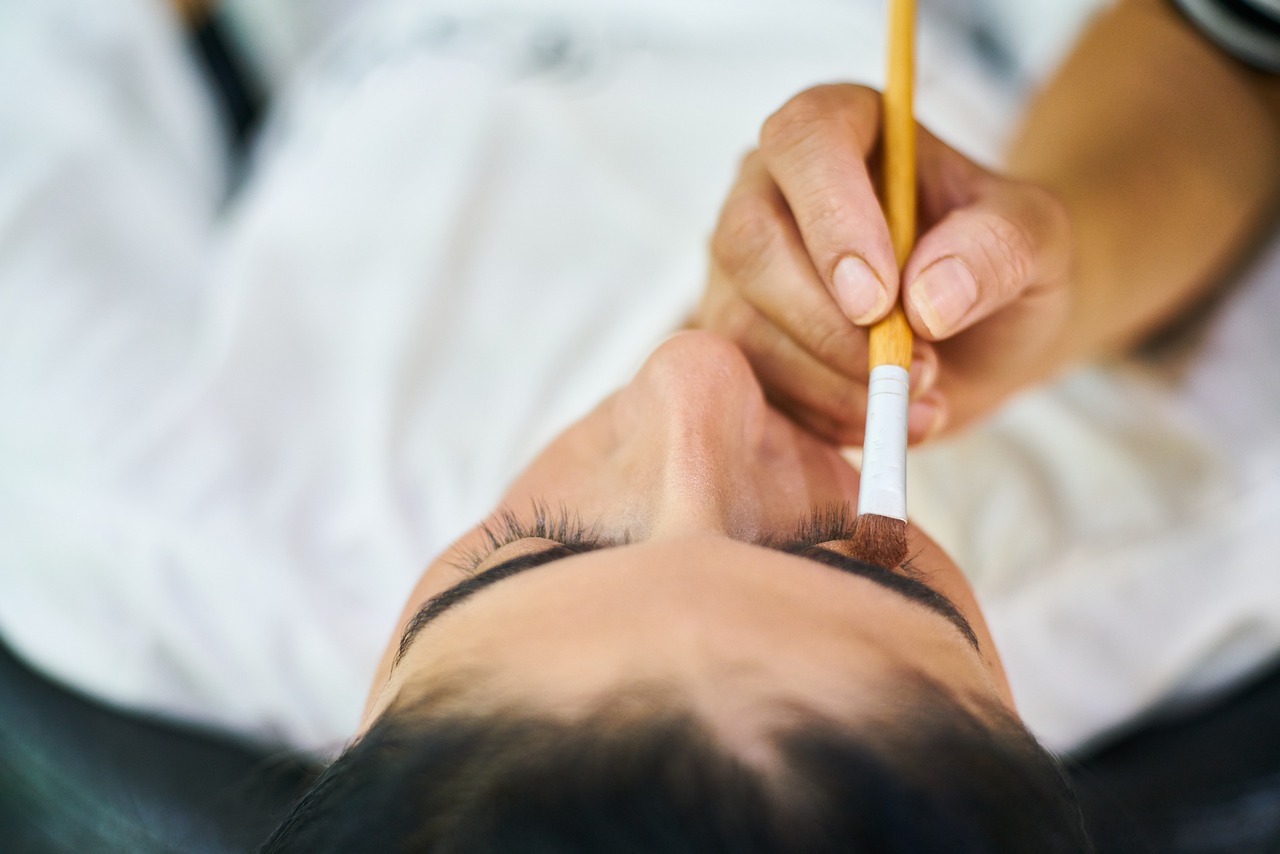How to Spot and Treat Skin Irritation During Grooming
Grooming is an essential part of our daily routine, but it can sometimes lead to unwanted skin irritation. Whether you're shaving, waxing, or simply using skincare products, your skin can react negatively, leading to discomfort and frustration. In this article, we'll delve into how to spot skin irritation early and what effective treatments are available to soothe and heal your skin. By understanding the signs and taking proactive measures, you can enjoy a smoother grooming experience without the worry of irritation.
Skin irritation can manifest in various forms, including redness, itching, and inflammation. It’s like the skin is throwing a little tantrum, and recognizing these signs early can help you implement effective treatment strategies. Think of your skin as a sensitive friend; it needs gentle handling and care. When it feels threatened or uncomfortable, it reacts, and that’s when you need to pay attention. By being aware of how your skin responds to different grooming practices, you can address issues before they escalate.
Identifying the root causes of skin irritation is essential for prevention. Common culprits include grooming products, techniques, and environmental factors that can trigger adverse reactions. Imagine your skin as a garden; if you introduce harmful chemicals or rough handling, it will wilt and show signs of distress. Here are some of the most frequent offenders:
Certain grooming products contain harsh chemicals or allergens that may irritate the skin. Understanding which ingredients to avoid can help you select safer alternatives. Keeping a close eye on product labels is crucial. Here are a few ingredients that often lead to irritation:
- Fragrances and Dyes: Fragrances and artificial dyes in grooming products can cause allergic reactions or sensitivity in some individuals. Opting for fragrance-free options can minimize irritation.
- Alcohol-Based Products: Alcohol can be drying and irritating to the skin. Choosing alcohol-free alternatives can help maintain skin hydration and prevent irritation during grooming.
The way grooming is performed can significantly impact skin health. Implementing gentle techniques can reduce the risk of irritation and promote healthier skin. Just like a painter needs to use the right brush strokes to create a masterpiece, you need to be mindful of how you handle your skin. Always use clean tools and avoid aggressive scrubbing. Instead, try to use smooth, circular motions when applying products or shaving.
Recognizing the symptoms of skin irritation is crucial for timely intervention. Common signs include redness, swelling, and discomfort that can arise during or after grooming. It’s like your skin is sending you a message, and you need to listen. Ignoring these signals can lead to more severe issues down the line.
Redness and inflammation are primary indicators of skin irritation. Understanding the severity of these symptoms can guide appropriate treatment measures. If your skin looks like a tomato after grooming, it's time to take action. Applying a soothing cream or gel can help calm the redness and restore balance.
Itching and discomfort often accompany skin irritation. Identifying these sensations early can help in applying soothing treatments and avoiding further irritation. Think of it as a warning bell; the sooner you address it, the better. If you find yourself scratching or feeling uncomfortable, it’s a sign that your skin needs some TLC.
Various treatment options are available for soothing irritated skin. These can range from over-the-counter remedies to natural solutions that promote healing. You don’t have to suffer in silence; there are ways to bring your skin back to its happy state.
Over-the-counter creams and ointments can provide immediate relief for irritated skin. Knowing which products are effective can aid in quick recovery. Look for creams containing ingredients like hydrocortisone or calamine, which can help reduce inflammation and soothe discomfort.
Natural remedies such as aloe vera and chamomile can soothe irritated skin. These gentle solutions can be like a cool breeze on a hot day, offering relief without the harshness of chemicals. Applying aloe vera gel directly to the affected area or using chamomile tea bags as a compress can work wonders. Exploring these options can offer gentle and effective relief without harsh chemicals.
- What should I do if my skin irritation doesn't improve? If your skin irritation persists or worsens, it's best to consult a dermatologist for professional advice.
- Can I use makeup on irritated skin? It's advisable to avoid makeup until the irritation subsides, as it can exacerbate the issue.
- Are there specific products for sensitive skin? Yes, look for products labeled as "hypoallergenic" or "for sensitive skin" to minimize the risk of irritation.

Understanding Skin Irritation
This article provides insights into identifying skin irritation caused by grooming practices and offers effective treatment options to soothe and heal irritated skin.
Skin irritation is a common issue that many people face, especially during grooming routines. It can present itself in various forms, such as redness, itching, and inflammation. Imagine your skin as a protective barrier; when this barrier is compromised, it reacts much like a warning signal, alerting you to potential problems. Recognizing these signs early can be crucial in implementing effective treatment strategies that not only soothe but also promote healing.
To better understand skin irritation, it's essential to consider its underlying mechanisms. When the skin is exposed to irritants, whether they be chemicals in grooming products or friction from grooming techniques, it can become inflamed. This inflammation is the body’s natural response to protect itself from further damage. Think of it as a fire alarm going off; it’s a sign that something isn’t right and requires your attention. The irritation can range from mild discomfort to severe reactions, depending on the individual’s skin type and the severity of the exposure.
Common symptoms of skin irritation can include:
- Redness: The skin may appear flushed or red, indicating increased blood flow to the affected area.
- Itching: This uncomfortable sensation often accompanies redness and can lead to scratching, which may worsen the irritation.
- Swelling: Inflammation can cause the skin to swell, making it feel tight or tender to the touch.
Understanding these symptoms is the first step toward effective treatment. By being aware of how your skin reacts to different grooming practices, you can make informed choices about the products you use and the techniques you employ. For instance, if you notice that a particular shaving cream causes your skin to react, it may be time to explore alternatives that are gentler and free from harsh chemicals.
Moreover, the environment plays a significant role in skin health. Factors such as temperature, humidity, and even pollution can exacerbate skin irritation. For example, using grooming products in a dry climate may lead to increased dryness and irritation. Thus, it’s important to assess not just the products you use, but also the conditions under which you groom.
In conclusion, understanding skin irritation is about recognizing the signs and symptoms, identifying the causes, and taking proactive steps to prevent further irritation. By being mindful of your grooming practices and the products you choose, you can maintain healthier skin and enjoy a more comfortable grooming experience.
Identifying the root causes of skin irritation is essential for prevention. Common culprits include grooming products, techniques, and environmental factors that can trigger adverse reactions.
Certain grooming products contain harsh chemicals or allergens that may irritate the skin. Understanding which ingredients to avoid can help in selecting safer alternatives.
Fragrances and artificial dyes in grooming products can cause allergic reactions or sensitivity in some individuals. Opting for fragrance-free options can minimize irritation.
Alcohol can be drying and irritating to the skin. Choosing alcohol-free alternatives can help maintain skin hydration and prevent irritation during grooming.
The way grooming is performed can significantly impact skin health. Implementing gentle techniques can reduce the risk of irritation and promote healthier skin.
Recognizing the symptoms of skin irritation is crucial for timely intervention. Common signs include redness, swelling, and discomfort that can arise during or after grooming.
Redness and inflammation are primary indicators of skin irritation. Understanding the severity of these symptoms can guide appropriate treatment measures.
Itching and discomfort often accompany skin irritation. Identifying these sensations early can help in applying soothing treatments and avoiding further irritation.
Various treatment options are available for soothing irritated skin. These can range from over-the-counter remedies to natural solutions that promote healing.
Over-the-counter creams and ointments can provide immediate relief for irritated skin. Knowing which products are effective can aid in quick recovery.
Natural remedies such as aloe vera and chamomile can soothe irritated skin. Exploring these options can offer gentle and effective relief without harsh chemicals.
Q: What should I do if my skin becomes irritated after grooming?
A: If you experience irritation, stop using the product or technique that caused it. Clean the area gently with mild soap and water, and apply a soothing cream or natural remedy.
Q: Can skin irritation lead to long-term damage?
A: Prolonged irritation can lead to more severe skin conditions, so it’s essential to address the issue promptly and adjust your grooming habits accordingly.
Q: Are there specific ingredients I should look for in grooming products?
A: Look for products labeled as hypoallergenic, fragrance-free, and alcohol-free to minimize the risk of irritation.

Common Causes of Skin Irritation
When it comes to grooming, many of us might not realize that our daily rituals can sometimes lead to skin irritation. It's like a sneaky little gremlin that pops up when we least expect it! Understanding the common causes of skin irritation is crucial for preventing those uncomfortable moments. Think of your skin as a delicate flower; it needs the right care and attention to bloom beautifully. If not, it can wilt and show signs of distress.
One of the primary offenders in the world of grooming is the products we use. Many grooming products, such as shampoos, conditioners, and shaving creams, can contain harsh chemicals that irritate the skin. For instance, sulfates, parabens, and certain preservatives can strip the skin of its natural oils, leading to dryness and irritation. It's essential to read labels carefully and be aware of what you're putting on your skin. If you're unsure about a product, consider opting for those labeled as hypoallergenic or dermatologist-tested.
Another significant factor is the techniques we employ during grooming. Rubbing your skin too hard or using blunt razors can cause micro-tears, leading to inflammation and discomfort. Imagine trying to polish a delicate piece of glass with sandpaper; it’s not going to end well! Instead, gentle strokes and the right tools can make a world of difference. Always ensure that your grooming tools are clean and sharp to minimize any potential irritation.
Environmental factors also play a role in skin irritation. Changes in weather, humidity, and pollution can affect our skin's barrier, making it more susceptible to irritation. For example, during winter months, the cold air can dry out your skin, while excessive sun exposure can cause redness and peeling. To combat this, consider using a moisturizer that suits your skin type and protects against environmental stressors.
Moreover, it’s essential to take note of any allergies you might have. Some individuals may react to specific ingredients found in grooming products, leading to allergic reactions. If you notice consistent irritation after using a particular product, it might be time to ditch it and look for alternatives. Keeping a skin diary can help you track which products cause issues and which ones work wonders for your skin.
In summary, being aware of the common causes of skin irritation is the first step in maintaining healthy skin during grooming. By choosing the right products, employing gentle techniques, and considering environmental impacts, you can significantly reduce the risk of irritation. Remember, your skin deserves the best care possible, so treat it with kindness and respect!
- What are the signs of skin irritation? Common signs include redness, itching, swelling, and discomfort.
- How can I prevent skin irritation while grooming? Use gentle products, avoid harsh chemicals, and adopt proper grooming techniques.
- Are there specific ingredients I should avoid? Yes, look out for fragrances, alcohol, and certain preservatives that can irritate the skin.
- What are some natural remedies for skin irritation? Aloe vera and chamomile are excellent natural options that can soothe irritated skin.
Grooming Products to Avoid
When it comes to grooming, the products you choose can make all the difference between a refreshing experience and a frustrating one. Understanding which grooming products to avoid is crucial for maintaining healthy skin. Many grooming products are laden with harsh chemicals that can irritate your skin, leading to discomfort and unsightly rashes. For instance, ingredients such as sulfates, parabens, and certain alcohols can strip your skin of its natural oils, causing dryness and irritation. It’s essential to be vigilant and read labels carefully.
One of the most common offenders in grooming products is fragrances. While they may make your products smell delightful, fragrances are often associated with allergic reactions and skin sensitivities. Studies have shown that many individuals experience redness and itching due to synthetic fragrances present in lotions, shampoos, and soaps. If you’re prone to skin irritation, opting for fragrance-free alternatives can significantly reduce your risk of adverse reactions.
Another category to be wary of is alcohol-based products. Alcohol is a notorious skin irritant that can dry out your skin, leading to a vicious cycle of irritation. When your skin becomes dry, it can become more sensitive and prone to irritation from other products. Instead, look for alcohol-free grooming products that hydrate the skin while providing the necessary cleansing or styling benefits. This minor switch can lead to a noticeable improvement in your skin's overall health.
Additionally, be cautious with products that contain artificial dyes. These dyes are often used to enhance the appearance of grooming products but can trigger allergic reactions in sensitive individuals. When possible, choose products with natural colorants or those that are clear in appearance. By doing so, you can help ensure that your grooming routine is not only effective but also gentle on your skin.
To summarize, here are some key grooming products and ingredients to avoid:
- Fragrance-laden products
- Alcohol-based lotions and toners
- Products with artificial dyes
- Harsh exfoliants and scrubs
By steering clear of these common irritants, you can create a more enjoyable grooming routine that prioritizes your skin's health. Remember, your skin is a reflection of your overall well-being, so treat it with the care it deserves!
1. What are the signs of skin irritation from grooming products?
Common signs include redness, itching, swelling, and a burning sensation. If you notice any of these symptoms, it’s best to discontinue use of the product and consult a dermatologist if necessary.
2. Can natural products cause skin irritation?
Yes, even natural products can cause skin irritation in some individuals. It’s important to test any new product on a small area of skin before applying it more broadly.
3. How can I choose the right grooming products for sensitive skin?
Look for products labeled as hypoallergenic, fragrance-free, and alcohol-free. Check the ingredient list for any known irritants and consider consulting with a dermatologist for personalized recommendations.
Fragrances and Dyes
When it comes to grooming products, fragrances and dyes can be sneaky culprits behind skin irritation. Many people might not realize that the pleasant scents and vibrant colors in their favorite lotions, shampoos, and creams could be causing their skin to react negatively. These additives can trigger allergic reactions or sensitivities, leading to discomfort that can ruin your grooming experience. Imagine applying a soothing cream only to find your skin turning redder than a tomato moments later!
Fragrances are often made from a concoction of synthetic chemicals that can be irritating, especially for individuals with sensitive skin. They may smell delightful, but the reality is that these fragrances can disrupt your skin's natural barrier, making it more susceptible to irritation. Similarly, artificial dyes, which are used to enhance the visual appeal of products, can also provoke reactions. The bright pink or green color of a product might catch your eye, but if it contains synthetic dyes, it might not be worth the risk for your skin.
So, what can you do to protect yourself? Here are a few tips to consider:
- Opt for fragrance-free products: Many brands offer fragrance-free alternatives that still provide effective results without the added irritants.
- Check the ingredient list: Be vigilant about reading labels. Look for products that use natural fragrances derived from essential oils instead of synthetic ones.
- Choose colorless options: Whenever possible, select products that are free from artificial dyes. Clear gels or creams often indicate fewer additives.
In essence, being mindful of the products you choose can make a world of difference. By steering clear of fragrances and dyes, you can help maintain your skin's health and keep irritation at bay. Remember, your skin deserves the best treatment, and sometimes that means going back to basics with simple, clean ingredients.
Q: How can I tell if a product contains irritating fragrances or dyes?
A: Always check the ingredient list on the product label. Look for words like "fragrance," "parfum," or specific dye names. If you're unsure, opt for products labeled as "fragrance-free" or "dye-free."
Q: Are natural fragrances safer for my skin?
A: While natural fragrances can be gentler, they can still cause reactions in some people. It's always best to patch test new products before full application.
Q: What should I do if I experience irritation from a product?
A: Discontinue use immediately, cleanse the area with mild soap and water, and apply a soothing cream or ointment. If irritation persists, consult a dermatologist.
Alcohol-Based Products
When it comes to grooming, many of us reach for products that promise a fresh, clean feel, but often these products contain alcohol, which can be a hidden culprit behind skin irritation. Alcohol-based products, such as certain aftershaves, toners, and hair sprays, can strip the skin of its natural oils, leading to dryness, redness, and discomfort. Imagine washing your hands with soap that leaves them feeling tight and parched—that's the same feeling your skin experiences when exposed to alcohol.
Using alcohol-based products can be particularly problematic for individuals with sensitive skin, as the drying effect can trigger a cycle of irritation. When the skin becomes dry, it can react by producing more oil, which in turn can lead to clogged pores and breakouts. This is why it's crucial to consider alternatives that are gentler on the skin.
So, what should you look for instead? Here are some key points to consider when selecting grooming products:
- Hydrating Ingredients: Look for products that contain hydrating ingredients like glycerin, hyaluronic acid, or aloe vera. These components help retain moisture and soothe the skin.
- Alcohol-Free Labels: Many brands now offer alcohol-free options. Always check the label to ensure that your grooming products are free from drying alcohols.
- Natural Alternatives: Consider using natural grooming products that leverage plant-based ingredients. These are often less irritating and more beneficial for your skin.
By opting for alcohol-free grooming products, you can maintain your skin's hydration and health, reducing the risk of irritation and discomfort. Remember, your skin deserves the best care, so take the time to choose products that will nurture rather than strip away its natural defenses.
Improving Grooming Techniques
This article provides insights into identifying skin irritation caused by grooming practices and offers effective treatment options to soothe and heal irritated skin.
Skin irritation can manifest in various forms, including redness, itching, and inflammation. Recognizing the signs early can help in implementing effective treatment strategies.
Identifying the root causes of skin irritation is essential for prevention. Common culprits include grooming products, techniques, and environmental factors that can trigger adverse reactions.
Certain grooming products contain harsh chemicals or allergens that may irritate the skin. Understanding which ingredients to avoid can help in selecting safer alternatives.
Fragrances and artificial dyes in grooming products can cause allergic reactions or sensitivity in some individuals. Opting for fragrance-free options can minimize irritation.
Alcohol can be drying and irritating to the skin. Choosing alcohol-free alternatives can help maintain skin hydration and prevent irritation during grooming.
When it comes to grooming, the techniques you use can make all the difference in how your skin reacts. Think of your skin as a delicate flower; if you handle it roughly, it might wilt or get damaged. So, how can you improve your grooming techniques to keep that flower blooming beautifully? Here are some key tips:
- Gentle Touch: Always approach your skin with a gentle hand. Rubbing or scrubbing too hard can lead to micro-tears, which can result in irritation.
- Proper Tools: Use high-quality grooming tools that are designed for your skin type. Dull razors or rough brushes can exacerbate irritation.
- Pre-Grooming Prep: Before you start grooming, prepare your skin by cleansing and moisturizing. This creates a barrier that can protect against irritation.
- Post-Grooming Care: After grooming, apply a soothing balm or lotion to calm any potential irritation. This is like giving your skin a comforting hug!
Additionally, consider the environment in which you groom. A well-lit, clean space can enhance your grooming experience and reduce the likelihood of introducing irritants. It’s also essential to be mindful of the products you use during grooming. Opt for those with natural ingredients and avoid anything that feels harsh on your skin. Remember, your skin is unique, and what works for one person may not work for another. So, pay attention to how your skin reacts and adjust your techniques accordingly.
Recognizing the symptoms of skin irritation is crucial for timely intervention. Common signs include redness, swelling, and discomfort that can arise during or after grooming.
Redness and inflammation are primary indicators of skin irritation. Understanding the severity of these symptoms can guide appropriate treatment measures.
Itching and discomfort often accompany skin irritation. Identifying these sensations early can help in applying soothing treatments and avoiding further irritation.
Various treatment options are available for soothing irritated skin. These can range from over-the-counter remedies to natural solutions that promote healing.
Over-the-counter creams and ointments can provide immediate relief for irritated skin. Knowing which products are effective can aid in quick recovery.
Natural remedies such as aloe vera and chamomile can soothe irritated skin. Exploring these options can offer gentle and effective relief without harsh chemicals.
Q: How can I tell if my skin is irritated?
A: Common signs of skin irritation include redness, itching, swelling, and discomfort. If you notice any of these symptoms after grooming, it's essential to take action.
Q: What should I do if my skin becomes irritated?
A: First, stop using any products that may have caused the irritation. Clean the area gently and apply a soothing cream or natural remedy, like aloe vera, to help calm the skin.
Q: Are there specific grooming products that are less likely to irritate my skin?
A: Yes! Look for products labeled as hypoallergenic, fragrance-free, and alcohol-free. These are generally gentler on the skin.
Q: How can I prevent skin irritation in the future?
A: To prevent skin irritation, improve your grooming techniques, choose gentle products, and always prepare your skin before grooming.

Signs of Skin Irritation
Recognizing the symptoms of skin irritation is crucial for timely intervention. When your skin starts to react, it can manifest in several ways, and being aware of these signs can help you take action before the irritation escalates. Common signs include redness, swelling, and general discomfort that can arise during or after grooming. Imagine your skin is like a sensitive alarm system; when it goes off, it’s your body’s way of telling you something isn’t right. So, let’s dive deeper into some of the most prevalent indicators that your skin might be in distress.
One of the first signs to look out for is redness. This can often appear as patches on your skin, signaling that your body is reacting to something—be it a product, technique, or environmental factor. Redness can be mild or severe, and understanding its severity can help guide your response. For instance, if you notice a slight pink hue, it might just be a temporary reaction, but if the redness is pronounced and accompanied by other symptoms, it’s time to take action. In cases of severe irritation, inflammation may also occur, leading to swelling and a feeling of warmth in the affected area.
Another common symptom is itching. If you find yourself constantly scratching or feeling the urge to rub your skin, it’s likely that irritation is at play. Itching can range from a mild annoyance to an overwhelming urge that can lead to further damage if you scratch too much. This sensation often accompanies redness and can be a sign that your skin is inflamed or reacting to an irritant. It’s like having an itch you just can’t scratch, and it can drive you a bit crazy!
Finally, discomfort is an overarching symptom that can encompass various feelings, such as tightness, burning, or a general sense of unease in the affected area. This discomfort can make grooming feel like a chore rather than a self-care ritual. If your skin feels like it’s on fire or simply uncomfortable, it’s essential to stop and assess what might be causing the irritation. Taking a moment to listen to your skin can save you from further distress.
To summarize, here are the key signs of skin irritation to keep in mind:
- Redness: A visible change in skin color, often a sign of inflammation.
- Itching: A persistent urge to scratch, indicating irritation.
- Discomfort: Feelings of tightness or burning sensations.
By paying attention to these signs, you can act quickly to address the irritation and prevent further complications. Remember, your skin is your body’s largest organ, and it deserves the utmost care and attention!
Q: What should I do if I notice signs of skin irritation?
A: If you notice any signs of skin irritation, it’s best to stop using the product or technique that triggered the reaction. Clean the affected area gently with a mild soap and water, and consider applying a soothing cream or ointment. If symptoms persist, consult a healthcare professional.
Q: Can skin irritation occur from natural products?
A: Yes, even natural products can cause skin irritation in some individuals, particularly if they have allergies or sensitivities to specific ingredients. Always perform a patch test before using a new product.
Q: How can I prevent skin irritation during grooming?
A: To prevent skin irritation, choose gentle grooming products, use proper techniques, and maintain a consistent skincare routine. It’s also helpful to be aware of any allergens that may trigger a reaction.
Redness and Inflammation
This article provides insights into identifying skin irritation caused by grooming practices and offers effective treatment options to soothe and heal irritated skin.
Skin irritation can manifest in various forms, including redness, itching, and inflammation. Recognizing the signs early can help in implementing effective treatment strategies.
Identifying the root causes of skin irritation is essential for prevention. Common culprits include grooming products, techniques, and environmental factors that can trigger adverse reactions.
Certain grooming products contain harsh chemicals or allergens that may irritate the skin. Understanding which ingredients to avoid can help in selecting safer alternatives.
Fragrances and artificial dyes in grooming products can cause allergic reactions or sensitivity in some individuals. Opting for fragrance-free options can minimize irritation.
Alcohol can be drying and irritating to the skin. Choosing alcohol-free alternatives can help maintain skin hydration and prevent irritation during grooming.
The way grooming is performed can significantly impact skin health. Implementing gentle techniques can reduce the risk of irritation and promote healthier skin.
Recognizing the symptoms of skin irritation is crucial for timely intervention. Common signs include redness, swelling, and discomfort that can arise during or after grooming.
are primary indicators of skin irritation. When your skin becomes red, it’s often a sign that your body is reacting to something, whether it be a product, technique, or environmental factor. Think of your skin as a protective barrier; when that barrier is compromised, it sends out a distress signal, and that signal often manifests as redness. This can feel like a warning light on your car dashboard – it’s telling you that something needs attention.
Inflammation can accompany redness, and together they can lead to discomfort. You might notice that the affected area feels warm to the touch or appears swollen. This reaction is your body’s way of increasing blood flow to the area to aid in healing, similar to how a firefighter responds to a blaze by dousing it with water. However, just as too much water can cause flooding, excessive inflammation can lead to further skin issues if not addressed promptly.
To better understand the relationship between redness, inflammation, and potential causes, consider the following table:
| Symptom | Possible Causes | Recommended Actions |
|---|---|---|
| Redness | Allergic reactions, Irritating ingredients, Over-exfoliation | Identify triggers, Switch to gentle products |
| Inflammation | Infection, Inflammatory skin conditions, Excessive friction | Consult a dermatologist, Use anti-inflammatory treatments |
It’s essential to monitor these symptoms closely. If you notice persistent redness or inflammation, it may be time to reevaluate your grooming routine. Consider keeping a grooming journal where you log products used and any reactions experienced. This can help identify patterns and pinpoint the culprits behind your skin irritation.
Various treatment options are available for soothing irritated skin. These can range from over-the-counter remedies to natural solutions that promote healing.
Over-the-counter creams and ointments can provide immediate relief for irritated skin. Knowing which products are effective can aid in quick recovery.
Natural remedies such as aloe vera and chamomile can soothe irritated skin. Exploring these options can offer gentle and effective relief without harsh chemicals.
- What should I do if my skin becomes irritated after grooming? - It’s best to stop using the product or technique that caused the irritation and apply a soothing cream or gel.
- How can I prevent skin irritation during grooming? - Use gentle products, avoid harsh chemicals, and adopt mild grooming techniques.
- Are there any natural remedies for skin irritation? - Yes, aloe vera, chamomile, and oatmeal baths can provide relief.
Itching and Discomfort
This article provides insights into identifying skin irritation caused by grooming practices and offers effective treatment options to soothe and heal irritated skin.
Skin irritation can manifest in various forms, including redness, itching, and inflammation. Recognizing the signs early can help in implementing effective treatment strategies.
Identifying the root causes of skin irritation is essential for prevention. Common culprits include grooming products, techniques, and environmental factors that can trigger adverse reactions.
Certain grooming products contain harsh chemicals or allergens that may irritate the skin. Understanding which ingredients to avoid can help in selecting safer alternatives.
Fragrances and artificial dyes in grooming products can cause allergic reactions or sensitivity in some individuals. Opting for fragrance-free options can minimize irritation.
Alcohol can be drying and irritating to the skin. Choosing alcohol-free alternatives can help maintain skin hydration and prevent irritation during grooming.
The way grooming is performed can significantly impact skin health. Implementing gentle techniques can reduce the risk of irritation and promote healthier skin.
Recognizing the symptoms of skin irritation is crucial for timely intervention. Common signs include redness, swelling, and discomfort that can arise during or after grooming.
Redness and inflammation are primary indicators of skin irritation. Understanding the severity of these symptoms can guide appropriate treatment measures.
Itching and discomfort are often the most distressing symptoms of skin irritation. When your skin feels itchy, it’s like an annoying itch that just won’t go away, making you want to scratch until the irritation subsides. This sensation can range from mild to severe, and it often leads to a cycle of scratching that can worsen the irritation. Just think of it as trying to ignore a pesky mosquito bite; the more you scratch, the more it itches!
It’s essential to pay attention to these sensations because they can signal underlying issues. Here are a few things to consider:
- Severity: How intense is the itching? Mild itching might just require a soothing lotion, while severe discomfort may need more immediate attention.
- Duration: If the itching lasts for more than a few hours, it’s a good idea to evaluate your grooming products and techniques.
- Location: Is the itching localized to a specific area, or is it more widespread? Localized itching might suggest a reaction to a particular product, while widespread discomfort could indicate a more systemic issue.
Ignoring these signs can lead to further complications, such as skin infections or chronic irritation. If you're experiencing persistent itching, it’s important to consult a dermatologist who can help identify the cause and recommend appropriate treatments. Remember, your skin is your body’s largest organ, and taking care of it should always be a priority!
Various treatment options are available for soothing irritated skin. These can range from over-the-counter remedies to natural solutions that promote healing.
Over-the-counter creams and ointments can provide immediate relief for irritated skin. Knowing which products are effective can aid in quick recovery.
Natural remedies such as aloe vera and chamomile can soothe irritated skin. Exploring these options can offer gentle and effective relief without harsh chemicals.
Q: What should I do if I experience severe itching after grooming?
A: If you experience severe itching, it’s best to stop using the products that may be causing the irritation and consult a dermatologist for advice.
Q: Can I use natural remedies for skin irritation?
A: Yes! Many natural remedies, like aloe vera and chamomile, are known for their soothing properties and can be effective in treating skin irritation.
Q: How can I prevent skin irritation during grooming?
A: To prevent skin irritation, choose gentle grooming products, avoid known allergens, and adopt softer grooming techniques.

Treatment Options for Skin Irritation
Treating skin irritation effectively is crucial for maintaining healthy skin and ensuring a comfortable grooming experience. Various treatment options are available, ranging from over-the-counter remedies to natural solutions that can soothe and heal irritated skin. When faced with skin irritation, it’s essential to choose the right treatment based on the severity and cause of the irritation. This not only helps in alleviating discomfort but also prevents future occurrences.
Over-the-counter remedies are often the first line of defense against skin irritation. These products usually contain active ingredients designed to reduce inflammation, hydrate the skin, and promote healing. For instance, creams containing hydrocortisone can be particularly effective in reducing redness and swelling. Another popular option is calamine lotion, which can provide soothing relief for itchy skin. When selecting an over-the-counter product, it’s important to read the labels carefully and choose those that are suitable for your specific skin type and the nature of the irritation.
In addition to commercial products, there are numerous natural remedies that can provide gentle and effective relief. Ingredients like aloe vera and chamomile have been used for centuries to soothe irritated skin. Aloe vera, known for its cooling properties, can help to hydrate and repair the skin barrier, making it an excellent choice for those experiencing dryness or redness. Chamomile, on the other hand, possesses anti-inflammatory properties and can be used as a tea or applied topically in cream form to calm irritated skin.
Another effective natural remedy is coconut oil, which is rich in fatty acids and has moisturizing properties that can help restore the skin’s natural barrier. Applying a thin layer of coconut oil can not only soothe irritation but also provide a protective layer against further irritation from grooming products. Moreover, oatmeal baths are a popular choice for relieving itching and discomfort, as oatmeal has natural anti-inflammatory properties that can help calm the skin.
For those who prefer a more holistic approach, essential oils can also be beneficial. Oils like lavender and tea tree have antiseptic and anti-inflammatory properties that can aid in soothing irritated skin. However, it’s crucial to dilute essential oils with a carrier oil before application to avoid further irritation. Always perform a patch test before using any new product, whether it’s commercial or natural, to ensure it doesn’t exacerbate the irritation.
In conclusion, treating skin irritation effectively requires a combination of understanding the underlying causes and selecting the appropriate treatment options. Whether opting for over-the-counter remedies or natural solutions, it’s essential to pay attention to how your skin reacts and adjust your grooming routine accordingly. Remember, the key to maintaining healthy skin lies in gentle care and informed choices.
1. What are the most common signs of skin irritation?
Common signs include redness, itching, swelling, and discomfort. If you notice any of these symptoms, it’s essential to address them promptly.
2. Can I use natural remedies alongside over-the-counter treatments?
Yes, many people find that combining both approaches can yield the best results. However, it's important to consult with a healthcare professional to avoid any adverse reactions.
3. How can I prevent skin irritation during grooming?
To prevent skin irritation, use gentle grooming techniques, choose products with safe ingredients, and always perform patch tests before trying new products.
4. When should I see a doctor for skin irritation?
If your skin irritation persists despite treatment, worsens, or is accompanied by severe symptoms such as blistering or pus, it’s important to seek medical advice.
Over-the-Counter Remedies
When it comes to treating skin irritation, can be a game-changer. These products are readily available and can provide immediate relief for those uncomfortable symptoms that often accompany skin irritation. From creams to ointments, there is a plethora of options to choose from, each designed to target specific issues. For instance, if you're experiencing redness and inflammation, look for products that contain hydrocortisone, which can help reduce swelling and soothe the skin.
Another effective option is calamine lotion, which is particularly useful for relieving itching and discomfort. It’s like a cool breeze on a hot day for your skin! Just imagine applying a lotion that not only calms your skin but also makes you feel instantly better. And let’s not forget about antihistamines, which can be beneficial if your irritation is allergy-related. They work by blocking the histamine response in your body, helping to alleviate those pesky allergic reactions.
However, it’s essential to choose the right product based on your specific symptoms. To help you navigate the options, here’s a quick comparison of some popular over-the-counter remedies:
| Product | Active Ingredient | Best For |
|---|---|---|
| Hydrocortisone Cream | Hydrocortisone | Redness and inflammation |
| Calamine Lotion | Calamine | Itching and discomfort |
| Antihistamines | Diphenhydramine | Allergic reactions |
While these remedies can provide significant relief, it’s crucial to follow the instructions on the packaging carefully. Overuse of creams, especially those containing steroids, can lead to thinning of the skin or other side effects. If your irritation persists or worsens, it’s best to consult a dermatologist for professional advice. After all, your skin is your body's largest organ, and it deserves the best care possible!
- What should I do if my skin irritation doesn’t improve? If symptoms persist for more than a few days or worsen, consult a healthcare provider.
- Can I use multiple over-the-counter remedies at once? It’s generally not recommended to mix products without consulting a healthcare provider, as they may interact negatively.
- Are natural remedies effective for skin irritation? Yes, many people find relief using natural remedies, but it’s essential to ensure they are suitable for your skin type.
Natural Remedies for Relief
When it comes to soothing irritated skin, natural remedies can be a game-changer. They’re like the gentle friends you turn to when you need comfort, offering relief without the harshness of chemicals. One of the most popular natural remedies is aloe vera. This succulent plant is renowned for its cooling properties and is often referred to as nature’s first aid kit. Applying fresh aloe vera gel directly to the affected area can help reduce redness and inflammation, making your skin feel rejuvenated.
Another fantastic option is chamomile. This lovely flower is not just for tea; it can work wonders for your skin too! Chamomile has anti-inflammatory properties that can help calm irritated skin. You can brew chamomile tea, let it cool, and then apply it with a cotton ball to the irritated area. It’s like giving your skin a soothing hug!
For those who enjoy DIY solutions, consider making a oatmeal bath. Oatmeal is a powerhouse when it comes to skin care. It helps to relieve itching and irritation, creating a protective barrier on the skin. To prepare, simply grind plain oats into a fine powder and add it to your warm bath. Soaking in this milky goodness is not only relaxing but also a wonderful way to treat your skin.
Additionally, honey is another natural ingredient that can aid in healing. Its antibacterial properties can help prevent infection while its moisturizing effects keep the skin hydrated. Applying a thin layer of raw honey to the irritated area for about 20 minutes before rinsing can provide soothing relief. Just imagine your skin drinking in all that natural goodness!
It’s essential to note that while these remedies are generally safe, it’s always a good idea to perform a patch test before applying anything new to your skin. This ensures that you won’t have an adverse reaction to the remedy. If irritation persists or worsens, seeking advice from a healthcare professional is crucial.
- Can I use essential oils for skin irritation?
Yes, certain essential oils like lavender and tea tree oil can be beneficial, but they should always be diluted with a carrier oil before application to avoid further irritation. - How long does it take for natural remedies to work?
Results can vary, but many people notice improvement within a few days of consistent use. Patience is key! - Are there any side effects to natural remedies?
While natural remedies are generally safe, some individuals may experience allergic reactions. Always do a patch test first.
Frequently Asked Questions
- What are the common signs of skin irritation during grooming?
Skin irritation can show up in several ways. Look out for redness, itching, and swelling. If you notice any of these symptoms, it’s crucial to address them quickly to prevent further discomfort.
- What grooming products should I avoid to prevent skin irritation?
It's best to steer clear of products with fragrances and artificial dyes, as these can trigger allergic reactions. Additionally, alcohol-based products can dry out your skin, leading to irritation, so opting for alcohol-free alternatives is wise.
- How can I improve my grooming techniques to minimize irritation?
Gentle techniques are key! Always use soft strokes and avoid applying too much pressure. Also, ensure your grooming tools are clean and sharp to reduce the risk of nicks and cuts that can lead to irritation.
- What over-the-counter remedies are effective for treating skin irritation?
Look for creams or ointments that contain hydrocortisone or calamine lotion. These can provide quick relief from irritation and help reduce inflammation.
- Are there natural remedies I can use for soothing irritated skin?
Absolutely! Natural options like aloe vera and chamomile are fantastic for calming irritated skin. They provide gentle relief without the harsh chemicals found in some commercial products.
- How do I know if my skin irritation requires medical attention?
If irritation persists despite using over-the-counter treatments, or if you experience severe symptoms like blistering or extreme swelling, it's time to consult a healthcare professional for further evaluation.
- Can lifestyle changes help reduce skin irritation?
Definitely! Staying hydrated, eating a balanced diet, and managing stress can all contribute to healthier skin. Additionally, wearing breathable fabrics can help minimize irritation during grooming.



















